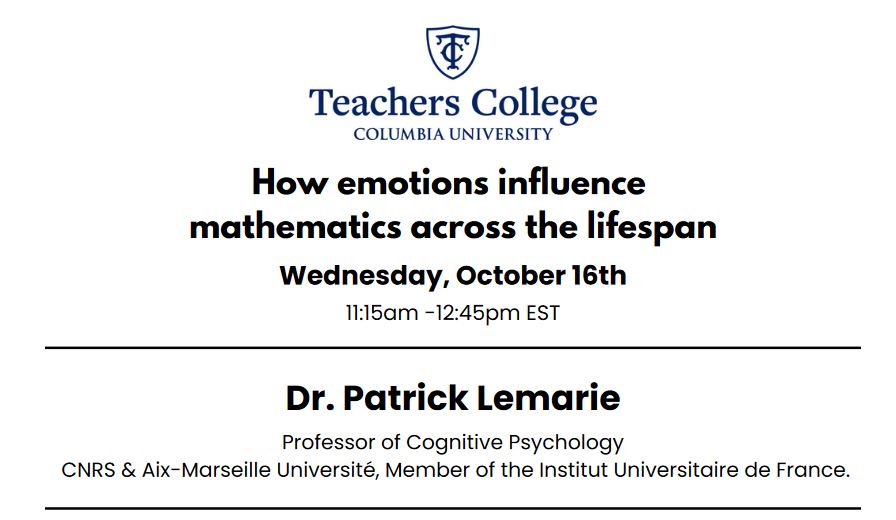
HUD Colloquium Fall 2024 Presents: Dr. Patrick Lemaire
The Human Development Colloquium Series Presents:
How emotions influence mathematics across the lifespan
Dr. Patrick Lemaire
Professor of Cognitive Psychology
CNRS & Aix-Marseille Université, Member of the Institut Universitaire de France.
Bio:
Dr. Patrick Lemaire is full Professor of Cognitive and Developmental Psychology in Aix-
Marseille University (CNRS) and member of the prestigious Institut Universitaire de France.
After he got his training as a Ph.D. in France, University of Burgundy (Dijon) and as a Post-
doc in the USA, Carnegie Mellon University (Pittsburgh, with R.S. Siegler), he obtained a full
and lifetime research position at CNRS, before taking a full professor position at Aix-
Marseille University. He carries out research aimed at understanding how does change occur
in cognition during aging and cognitive development, and how cognition is influenced by a
variety of factors, including emotions. He carries his research mostly in the domain of
arithmetic and uses both behavioral (i.e., solution times, percent errors, video recordings,
verbal protocols, eye movements) and neuro-imaging (e.g., ERP, fMRI, MEG) data. Author or
co-author of 12 books and over 190 papers in peer-review journals, his list of publications can
Abstract: Research on the role of emotions on cognition aims at determining if, when, and how
emotions influence cognitive performance. This has been investigated in a number of areas,
including attention, memory, reasoning, decision making, language, and problem solving.
Previous research is limited both empirically and theoretically. Empirically, effects of
emotions have not been much studied in several cognitive domains, including arithmetic.
Theoretically, mechanisms via which emotions affect cognition are unclear. In this talk, after a
brief overview of previous findings on how emotions affect cognition, I will present several
studies that shed important lights on how arithmetic is influenced by emotions. The studies
that I will present have been run in young and older adults, as well as in children aged 8–15.
To make theoretical advances, I propose to examine emotion-cognition interactions and how
these interactions change with participants’ age with a strategy approach. This entails
examining how emotions changes the strategy repertoire (number and types of strategies),
distribution (how often each strategy is used) strategy selection (or choosing the best strategy
on each item) and strategy execution (or relative efficiency of different strategies) while
participants accomplish cognitive task and analyzing which strategy is used and performance
on each item. In the series of studies I am going to present, participants had to accomplish a
variety of arithmetic problem-solving tasks. The data show that emotions influence strategic
aspects of cognitive performance (e.g., negative emotions shrink strategy repertoire and
decrease better strategy selection) and that this influence vary with participants’ age (e.g.,
emotions influence strategy repertoire only in young adults, but not in older adults or children,
but influence strategy execution more in younger than older participants as well as in
children). Such findings help further our understanding of how emotions influence arithmetic
performance as well as how this influence changes during both childhood and adulthood.
To request disability-related accommodations, contact OASID at oasid@tc.edu, (212) 678-3689, as early as possible.
